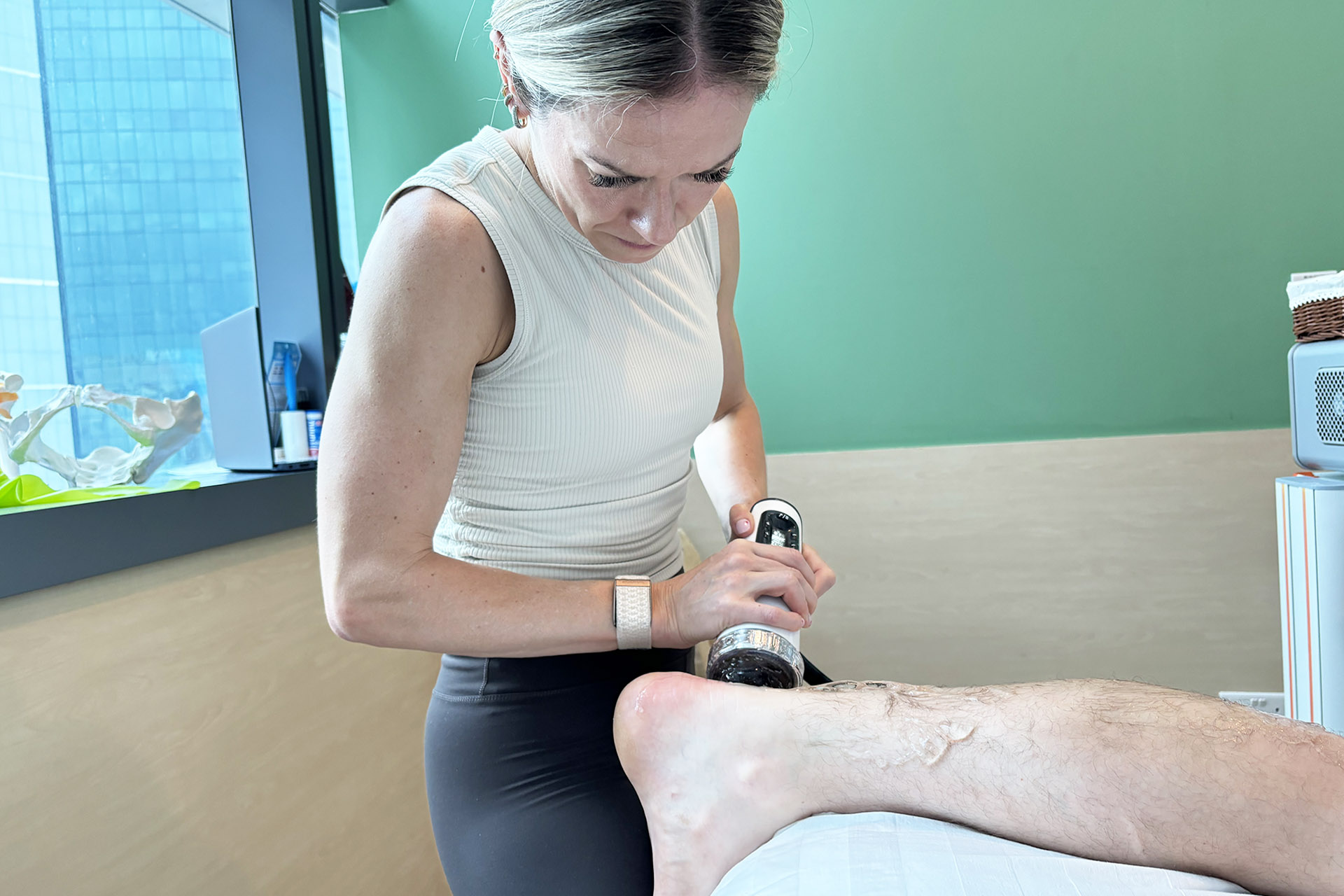|
Getting your Trinity Audio player ready...
|
The first step out of bed shouldn’t be painful. However, for those with plantar fasciitis, that first step can be a sharp, stabbing sensation that lasts all day. Runners, especially, will experience this frustrating discomfort at some point. While conventional treatments give temporary relief, physiotherapy tackles your plantar fasciitis pain and the underlying causes.
What Is Plantar Fasciitis?
Plantar fasciitis occurs when the plantar fascia – a thick band of tissue connecting your heel bone to your toes – becomes inflamed. This inflammation is caused by excessive strain and repeated microtrauma to the tissue, resulting in tiny tears that lead to pain and stiffness.
The symptoms of plantar fasciitis include:
- Sharp pain with the first step in the morning
- A pain that decreases after walking but returns after standing for a long time
- More discomfort after exercise but not during the exercise itself
- Sharp pain when climbing stairs or standing on tiptoes
- Swelling and redness in the heel or bottom of the foot
Many patients describe plantar fasciitis pain as most severe in the heel area, but the pain can radiate along the entire arch of the foot. The condition develops gradually over weeks or months and can linger for a long time if patients do not seek treatment.
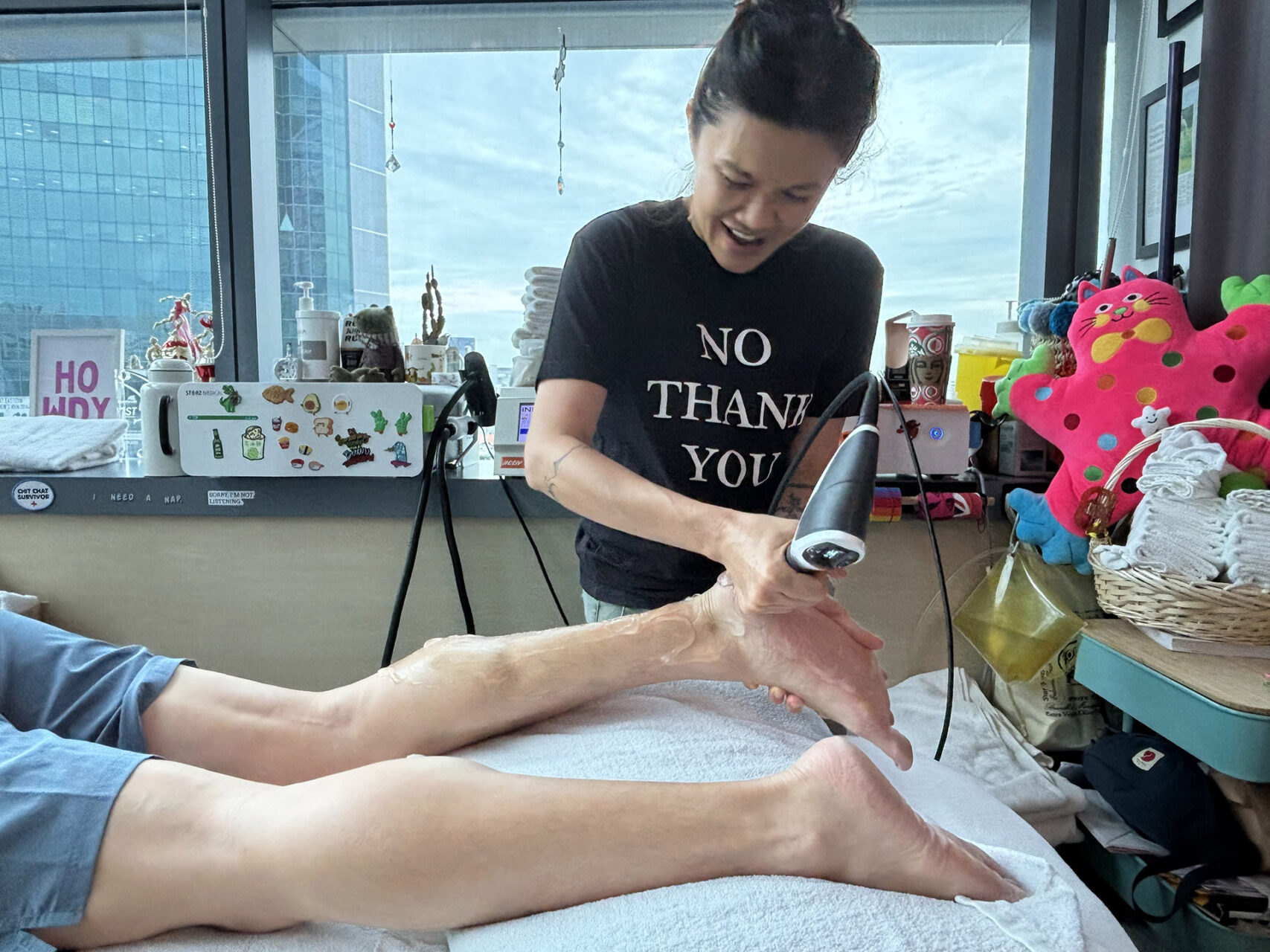
Causes and Risk Factors of Plantar Fasciitis
We are all at risk of developing plantar fasciitis, and several risk factors can increase your chances of developing this uncomfortable and painful condition:
- Age: Plantar fasciitis typically occurs in people over 25 years old and under 65 years old.
- Obesity: Excess weight adds undue stress to the plantar fascia.
- High-Impact Activities: Running, jumping and other high-impact activities put more pressure on the fascia.
- Prolonged Standing: Jobs or activities requiring long standing or walking can increase the chances of developing plantar fasciitis.
- Improper Footwear: Shoes that lack proper support or don’t fit well can force the foot to absorb the force of each step in unnatural ways.
- Foot Structure: Flat feet or high arches affect weight distribution across the foot.
- Medical Conditions: Conditions like rheumatoid arthritis and diabetes increase the risk of plantar fasciitis.
Knowing these causes and risk factors can help you take preventive measures to avoid plantar fasciitis pain.
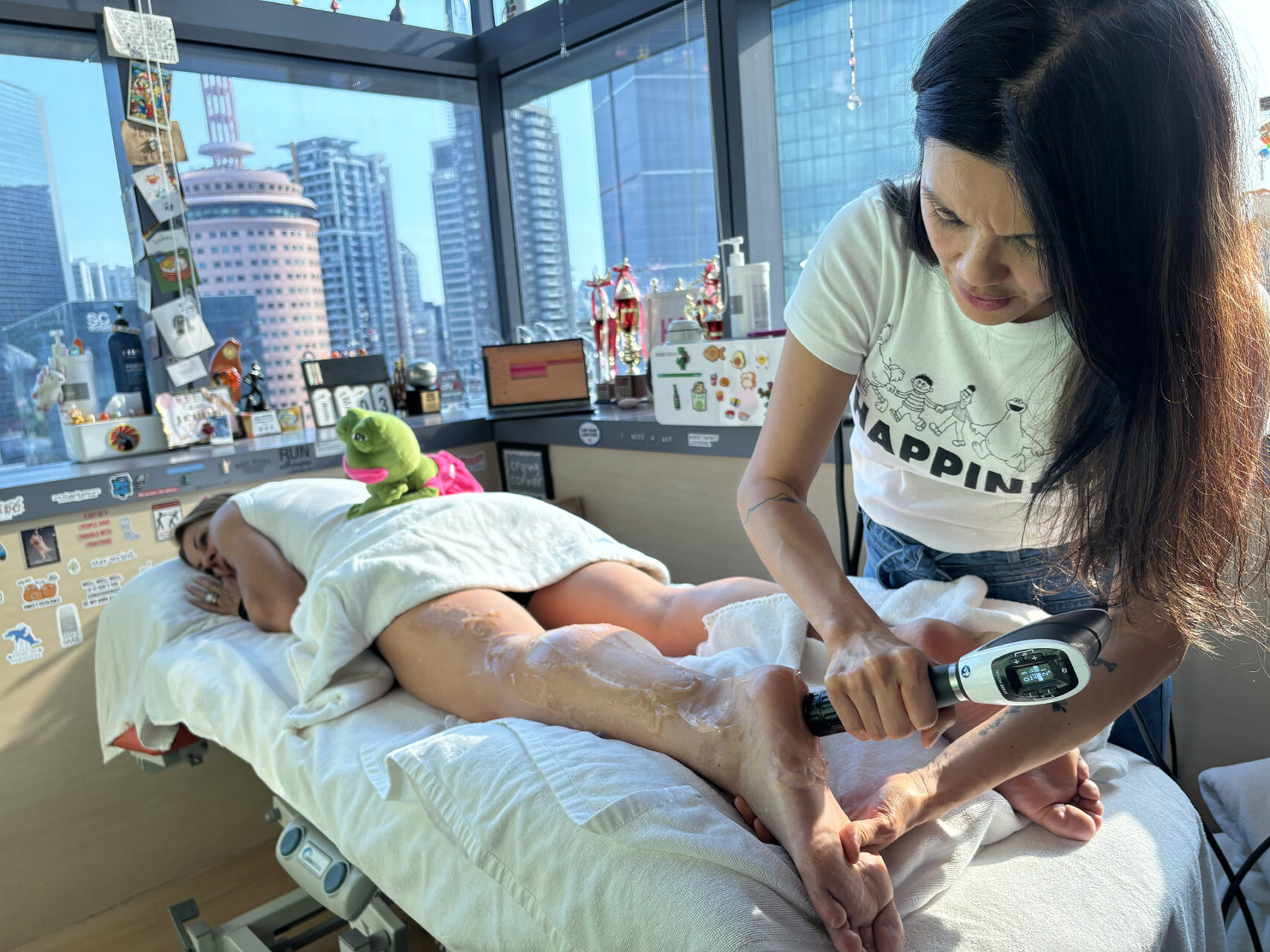
Diagnosing Plantar Fasciitis
If you have persistent foot pain, seek a proper diagnosis from a physiotherapist. Early intervention can improve your quality of life and prevent further complications.
During a physical examination, your physiotherapist will check your foot for signs of plantar fasciitis, such as pain in the heel or bottom of the foot, swelling, or redness. You will also be tested for limited mobility or stiffness in the foot or ankle. Your physiotherapist will also observe your walking pattern to identify any abnormalities contributing to the condition.
Sometimes, your physiotherapist may request imaging studies such as X-rays or an ultrasound to rule out conditions like heel spurs, fractures, or arthritis. A proper diagnosis ensures you receive the proper and effective treatment for your plantar fasciitis.
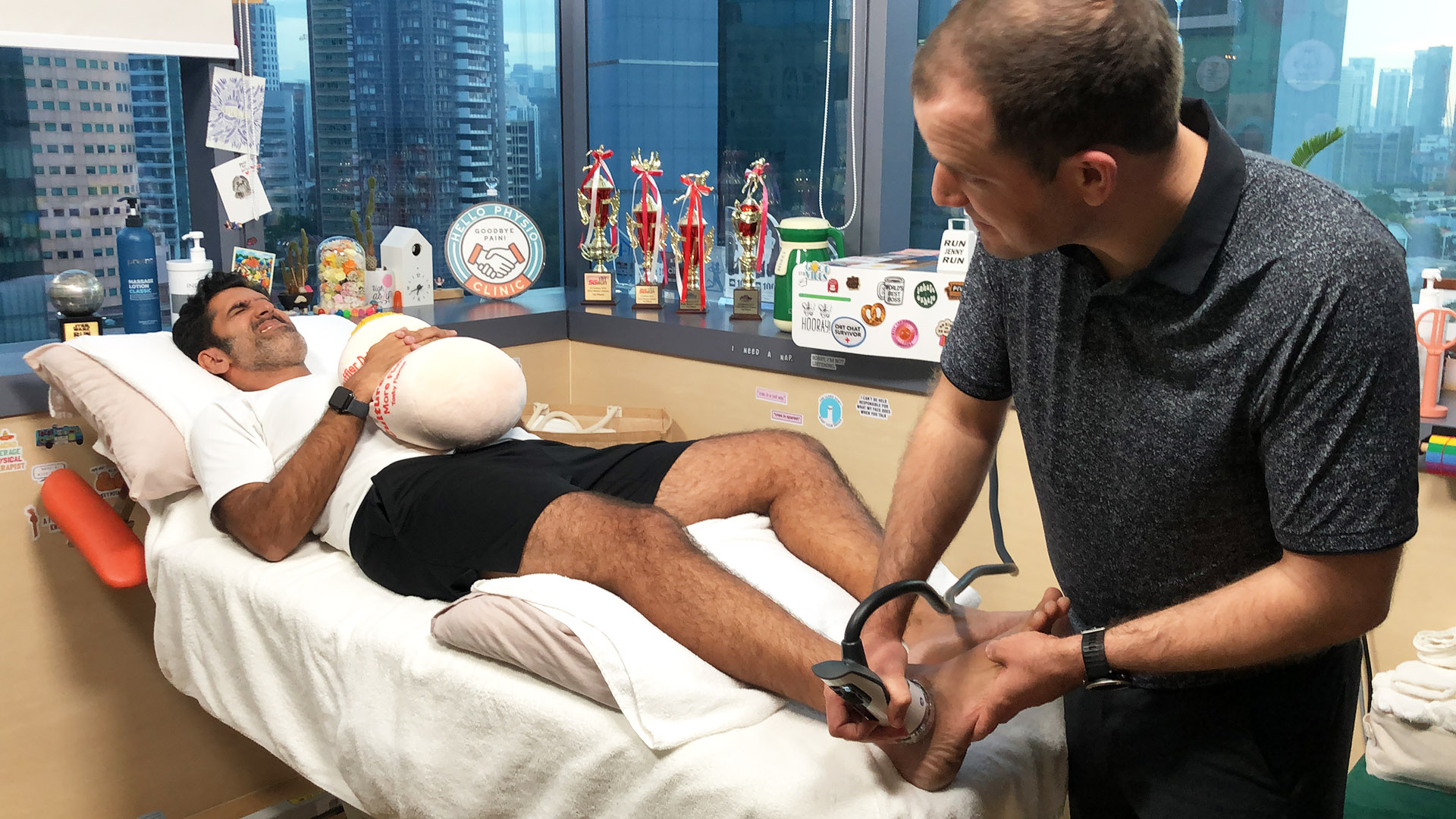
Physiotherapy for Plantar Fasciitis Pain
Unlike conventional treatments that focus on pain management, physiotherapy offers a multifaceted approach to plantar fasciitis pain relief. By addressing biomechanical inefficiencies, tissue health, and functional movement patterns, physiotherapists help patients achieve long-term recovery beyond temporary symptom relief.
A comprehensive physiotherapy program typically involves:
- Thorough Assessment: Identifying contributing factors such as foot mechanics, muscle imbalances and movement patterns that may contribute to the condition.
- Manual Therapy: Hands-on techniques to improve tissue mobility, reduce adhesions, and enhance blood flow to the affected area.
- Exercise Prescription: Customized stretching and strengthening protocols to target the plantar fascia, calf, and intrinsic foot muscles.
- Gait Analysis: Evaluation of walking and running mechanics to address compensatory patterns that may be contributing to the condition.
- Advanced Modalities: Specialized treatments that accelerate healing and provide effective plantar fasciitis pain treatment.
Two cutting-edge modalities are at the forefront of physiotherapy innovation for plantar fasciitis pain: INDIBA® Activ and Shockwave Therapy. These therapies offer significant advantages over conventional treatments, especially for patients with persistent symptoms.
Most patients will experience significant improvement within 2-6 weeks if they consistently follow a comprehensive physiotherapy program. However, complete resolution of chronic cases may take longer, especially if the condition has been present for an extended period before treatment starts.
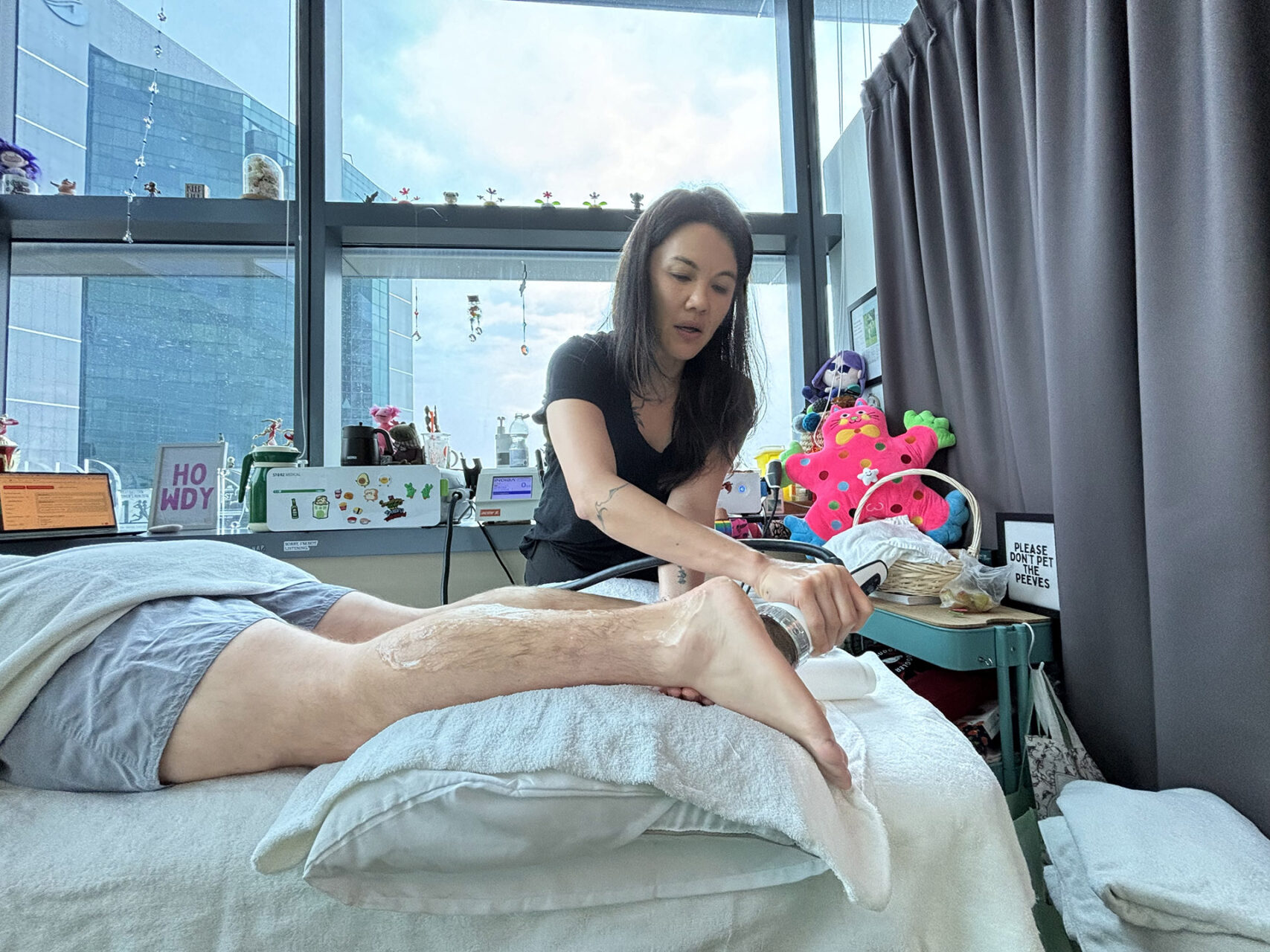
INDIBA® Activ Therapy Healing at the Cellular Level
This radiofrequency-based therapy works at 448 kHz – a frequency shown to optimize cellular function and accelerate natural healing processes. It’s a game changer in plantar fasciitis pain treatment by doing the following:
- Biostimulation: The radiofrequency energy boosts cellular metabolism, accelerating the natural repair of damaged plantar fascia tissue. This promotes the production of collagen — the primary structural protein in connective tissues — to facilitate the proper healing of microtrauma in the fascia.
- Microcirculation: This advanced treatment increases blood flow to the affected area, delivering essential nutrients and oxygen while removing inflammatory byproducts. This improved circulation mainly benefits the plantar fascia with limited blood supply.
- Vascular Effect: The therapy dilates blood vessels, reducing tissue congestion and decreasing the concentration of pain-inducing substances in the area.
- Anti-Inflammatory Action: By modulating the body’s inflammatory response, INDIBA® reduces the chronic inflammation that characterizes plantar fasciitis.
Patients typically report a pleasant warming sensation during treatment, and many experience a reduction in plantar fasciitis pain symptoms after just one session.
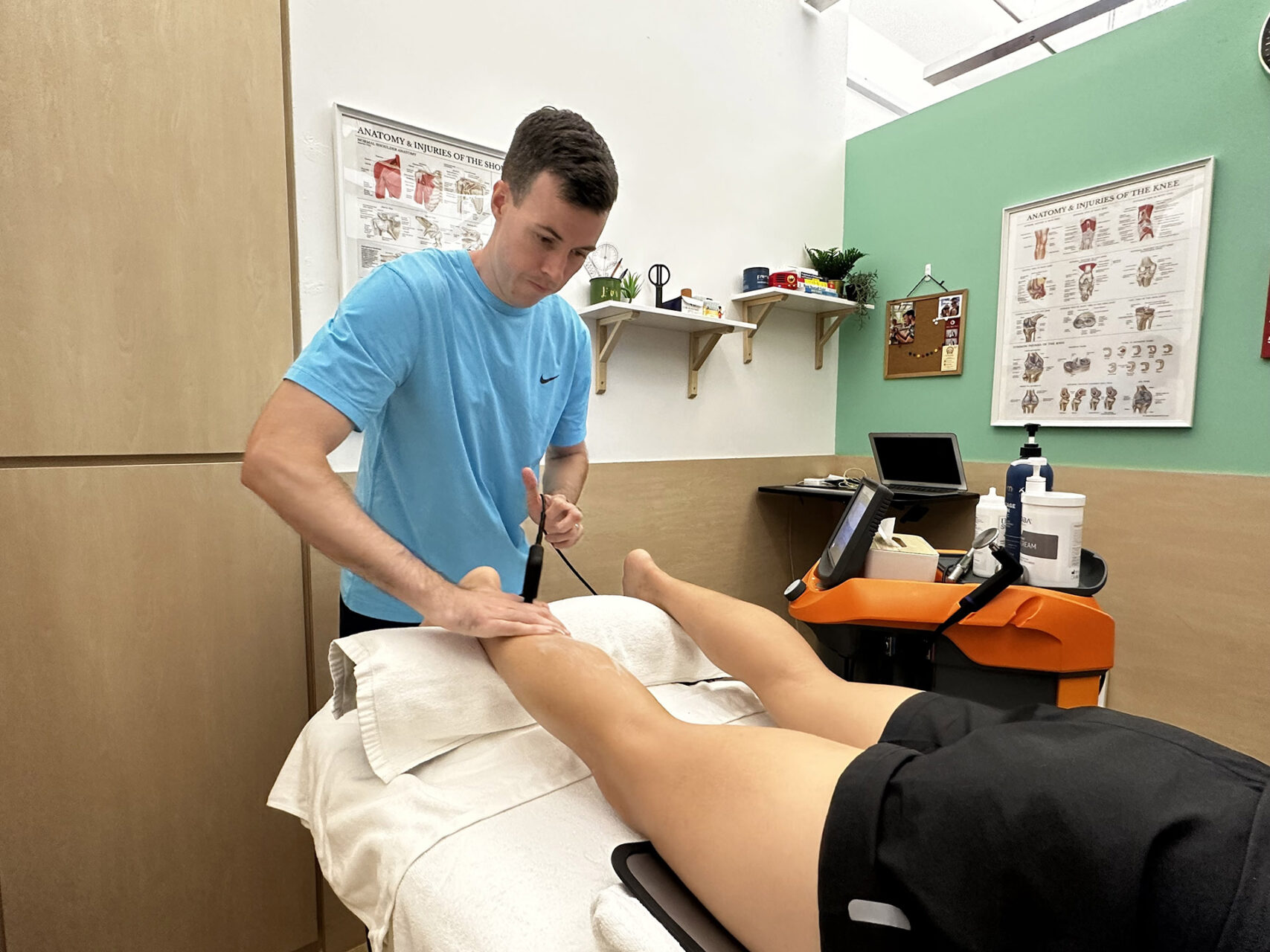
Shockwave Therapy for Tissue Regeneration
Shockwave Therapy delivers high-energy acoustic waves to the affected tissues, triggering beneficial physiological responses. The mechanisms of action are:
- Mechanotransduction: The acoustic waves convert mechanical energy into biochemical signals that stimulate cellular responses, including the production of growth factors essential for tissue repair in the foot.
- Neovascularization: Shockwave Therapy promotes the formation of new blood vessels in the affected area, increasing the delivery of nutrients and oxygen to the plantar fascia.
- Reversal of Chronic Inflammation: The treatment interrupts the cycle of chronic inflammation characteristic of plantar fasciitis, which can make the tissue environment go from inflammatory to regenerative.
- Pain Modulation: Shockwave Therapy affects pain perception through several mechanisms, including disrupting pain signal transmission and releasing endorphins, the body’s natural painkillers.
- Calcification Breakdown: For cases involving calcium deposits in the plantar fascia, Shockwave Therapy can break down these deposits, restoring normal tissue elasticity.
Research shows that Shockwave Therapy can be highly effective for patients with chronic plantar fasciitis pain that has not responded to conventional treatments.
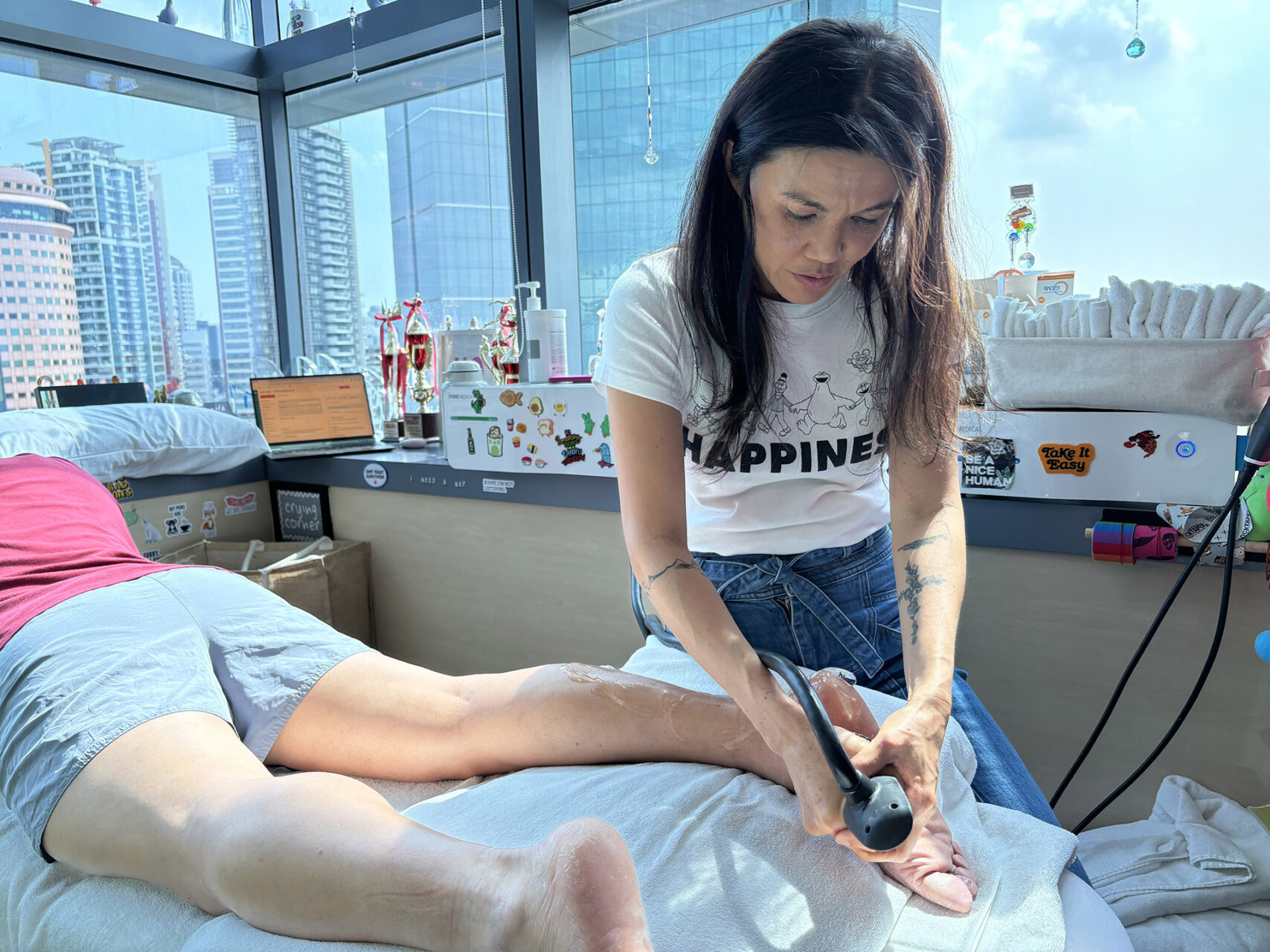
Beyond the Treatment Room
While advanced modalities like INDIBA Activ and Shockwave Therapy are the foundation of active, effective plantar fasciitis pain treatment, physiotherapists also emphasize holistic management strategies that you can utilize daily:
- Load Management: Your physiotherapist will advise you on activity modification to prevent symptoms from exacerbating while maintaining your fitness levels.
- Footwear Recommendations: Proper footwear that supports and reduces strain on the plantar fascia is vital to sustaining recovery.
- Education: Importantly, your physiotherapist will empower you with knowledge about your condition and self-management strategies to prevent recurrence.
- Exercise Prescription: To prevent and manage plantar fasciitis, it’s vital to follow your stretching routine and maintain the flexibility of the Achilles tendon.
This comprehensive approach ensures that patients receive relief from current plantar fasciitis pain symptoms, learn to treat plantar fasciitis, and prevent future episodes.
Plantar Fasciitis Prevention
Preventing plantar fasciitis involves a combination of proper footwear, exercises and lifestyle modifications. Here are some practical tips to help you avoid getting plantar fasciitis:
- Wear Supportive Shoes: Choose shoes that fit well and have good arch support and cushioning.
- Stretch Regularly: Stretch your calf muscles and plantar fascia before and after exercise.
- Maintain a Healthy Weight: Keep your weight in check to reduce strain on your plantar fascia.
- Avoid Hard Surfaces: Avoid running or jumping on hard surfaces and opt for softer terrain.
- Take Breaks: If your job requires standing or walking for long periods, take regular breaks to rest and stretch your feet.
By following these tips, you can reduce your risk of plantar fasciitis and alleviate symptoms if you already have the condition.
Take the First Step to Relief from Plantar Fasciitis Pain
If you’re experiencing morning pain, arch discomfort, or activity-related symptoms of plantar fasciitis, don’t resign yourself to living with the condition. Early intervention and prevention are key to preventing plantar fasciitis and chronic pain. Advanced physiotherapy treatments like INDIBA Activ and Shockwave Therapy can address the underlying causes of your discomfort.
At HelloPhysio, our team of experienced physiotherapists specialize in comprehensive plantar fasciitis pain treatment using evidence-based approaches tailored to your needs. Contact us today to book an appointment and start your day right and pain-free.

